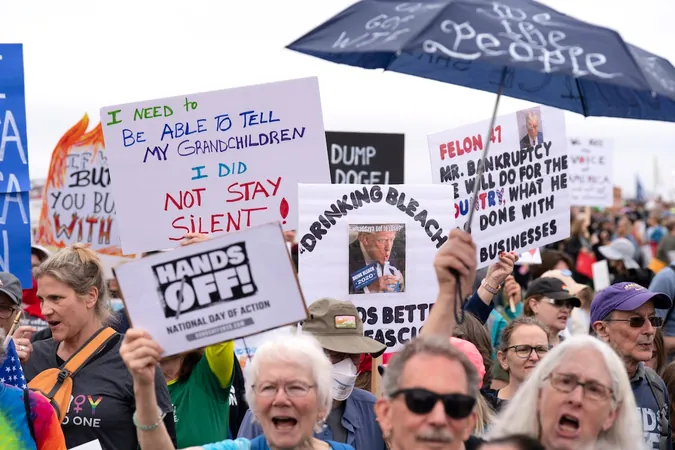
Nationwide Outcry: Thousands Rally Against Trump's Controversial Government Overhaul and Trade Policies
2025-04-06
Author: Jacques
Nationwide Protests Against Trump's Policies
On Saturday, a wave of dissent surged through the streets of Washington, D.C., and numerous cities across the United States, as thousands of protesters gathered to voice their opposition to President Donald Trump’s sweeping changes to government operations and his escalating trade conflicts with other nations. The demonstrations, part of the expansive Hands Off! movement, were organized by over 150 grassroots organizations, including civil rights groups, labor unions, LGBTQ+ advocates, veterans, and electoral reform activists, spanning all 50 states.
As protesters congregated on the National Mall, signs and chants echoed a collective frustration with Trump’s administration. Messages denouncing the president ranged from “Putin’s puppet” to emphatic calls to protect democracy and civil liberties, with slogans like “Hands off free speech” prominently displayed. Specific criticisms targeted Trump’s controversial tariffs, labeled as “taxes on your grocery bills” by some demonstrators, drawing attention to their financial impact on ordinary Americans.
Diverse Voices Joining the Movement
Among those marching were diverse individuals showcasing solidarity with global causes, such as Ukraine and Palestine. Notably, some participants wore traditional keffiyeh scarves and carried banners advocating for Palestinian rights. Attendees like Peter and Marianne Martz articulated that their motivation for joining the protest stemmed from a desire to protect federal workers threatened by Trump’s mass job cuts via the Department of Government Efficiency (DOGE).
This agency has been criticized for implementing widespread firings across various federal sectors, leaving many employees anxious about their futures. "We’re here for American rights," stated an impassioned Mr. Martz, emphasizing the dire circumstances federal employees and healthcare programs like Medicare and Medicaid face under the current administration.
Passionate Speakers and Personal Stories
Speakers attempted to inspire the crowd, but their words were often drowned out by the ringing chants of concerned citizens. Notable speakers included Democrat Congressman Jamie Raskin, who condemned Trump’s actions as dictatorial, stating, "No moral person wants an economy-crashing dictator who knows the price of everything and the value of nothing."
Personal stories added emotional weight to the protest, as multi-national citizens like Blanche Aaron reflected on their own struggles with the shifting political landscape. With her husband Dave by her side, she held a sign featuring a beaver proudly displaying the Canadian flag, expressing concern over Trump’s controversial remarks about Canada and Greenland. "We are losing our democracy...I think it’s dire," she lamented.
Impact on U.S.-Canada Relations
The tension surrounding U.S.-Canada relations was palpable, with many protesters expressing heartbreak over what they saw as a deteriorating friendship between the two nations. Janet Major, another participant, shared her distress about the implications of Trump’s foreign policy comments, stating that the United States has enjoyed a beneficial relationship with Canada for years, making the current rhetoric feel particularly jarring.
A Peaceful Assembly
Despite the seriousness of the gathering, the rallies remained peaceful, with no reports of arrests during the day’s events. While the protesters rallied in Washington, Trump was occupied with a round of golf in Florida, far removed from the concerns and frustrations of those massed in the capital.
Global Resonance of the Movement
Internationally, similar anti-Trump protests unfolded in significant European cities such as Berlin, Frankfurt, Paris, and London, showcasing the global resonance of the discontent brewing against Trump’s polarizing leadership style.
As the protests concluded, one thing was clear: a significant faction of the American populace is determined to resist perceived threats to democratic values and civil rights, and they are willing to mobilize across states and borders to make their voices heard.









 Brasil (PT)
Brasil (PT)
 Canada (EN)
Canada (EN)
 Chile (ES)
Chile (ES)
 Česko (CS)
Česko (CS)
 대한민국 (KO)
대한민국 (KO)
 España (ES)
España (ES)
 France (FR)
France (FR)
 Hong Kong (EN)
Hong Kong (EN)
 Italia (IT)
Italia (IT)
 日本 (JA)
日本 (JA)
 Magyarország (HU)
Magyarország (HU)
 Norge (NO)
Norge (NO)
 Polska (PL)
Polska (PL)
 Schweiz (DE)
Schweiz (DE)
 Singapore (EN)
Singapore (EN)
 Sverige (SV)
Sverige (SV)
 Suomi (FI)
Suomi (FI)
 Türkiye (TR)
Türkiye (TR)
 الإمارات العربية المتحدة (AR)
الإمارات العربية المتحدة (AR)